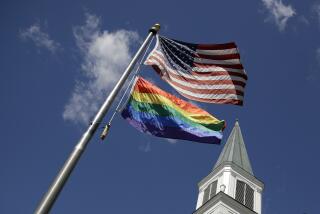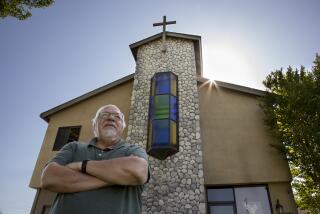RELIGION / JOHN DART : Plan to Merge 9 Denominations Is Fading From Lack of Interest
- Share via
The goal of church unity ranks with apple pie and motherhood in mainline Protestantism, but when 15 church people gathered recently to talk about the latest proposal from the 30-year-old Consultation on Church Union, the discussion was dutiful yet unenthusiastic.
No one was unsympathetic at the meeting in Canoga Park, and one participant called himself an “ecu-maniac,” a play on the word ecumenical .
Yet no one had read a 100-page booklet, published in 1989, on the proposed “covenant” relationship between nine denominations that is scheduled to go before national church conventions in the next few years.
If anything, the session illustrated how much the U.S. religious climate has changed over three decades.
The once-flourishing ecumenical churches are losing members, squabbling over sexual-social issues, fighting an economic downturn and finding that broad interfaith coalitions matter more than church chumminess.
Back in the 1960s, when many church people were uneasy with Protestant Christianity’s division into so many denominations, Consultation on Church Union’s original plan to merge several church bodies stirred excitement. Some members did merge on their own: the Methodist Church and the Evangelical United Brethren into the United Methodist Church and Presbyterianism’s northern and southern branches into the Presbyterian Church (U.S.A.).
But the plan floundered when less-similar churches found troubling differences in tradition, bishops and other details.
The nine participants did, however, hammer out a theological consensus, keeping hopes alive for some form of linkage. The nine are: African Methodist Episcopal Church, African Methodist Episcopal Zion Church, Christian Church (Disciples of Christ), Christian Methodist Episcopal Church, Episcopal Church, International Council of Community Churches, Presbyterian Church (U.S.A.), United Church of Christ and United Methodist Church.
Now, a proposal for a less-ambitious covenant has gone begging for attention. That was especially evident at the meeting Tuesday.
“I thought COCU had gone underground for a few years because it had not been active in Los Angeles,” the Rev. Riess Potterveld, pastor of Congregational Church of Northridge, confessed to fellow participants. Likewise, the Rev. Chet Gean, pastor of Kirk o’ the Valley Presbyterian Church in Reseda, said he couldn’t remember hearing anything about the effort for the last 10 years.
Leading the meeting was an architect of the covenant proposal, the Rev. William Laurie, a United Church of Christ minister from the Berkeley area. “Our hopes are high, but they’ve been shot down before,” Laurie admitted.
Literature on the plan pictures the covenant emerging along these lines:
The church sign out front says not only St. Luke’s Episcopal or Reseda First Christian but also “The Church of Christ Uniting” as a second identification. Congregations assemble periodically in a park or auditorium for a Communion service to symbolize their oneness. No hesitancy occurs when a member of one denomination takes Communion in another church.
When one is ordained to the clergy, representatives of other denominations share in the rite to further the idea that a minister in one church is seen as a minister in all nine.
Most church-run community projects will be shared by member churches in the area.
Some ministers had good words for a few of the goals.
The Rev. Robert Fernandez, a Panorama City-based regional administrator for the Presbyterian Church, said that mutual recognition of churches and clergy “would minimize the sense of competition . . . and help us focus on reaching the unchurched.”
The Rev. Tom Rennard, associate pastor at Granada Hills First Presbyterian Church, said he would like to see a baptismal certificate that would be honored everywhere.
The Rev. Allyn Axelton, a Methodist who serves as campus minister at Cal State Northridge, noted that his bishop, Jack M. Tuell, already invites other denominational officials to join him in ordaining men and women.
The question remained, however, whether studying, discussing and adopting the plan was worth the effort when churchgoers themselves pay less attention to denominational distinctions.
“Reports say that denominational loyalty among lay people is at an all-time low,” said the Rev. Philip Price, pastor of Woodland Hills Community Church.
Virginia Louaillier, a member of his congregation who took part in the meeting, said she is living testimony of that. “In my life, I’ve been a member of three Presbyterian, two Methodist, three Episcopal and two United Church of Christ congregations,” she said.
Charles Dugan, a lay leader at Potterveld’s church, declared that people go to a church because they like the minister or because the facility is close to home. “Only 10% in the congregation are really interested in whether it says Presbyterian or Congregational on the sign out front,” Dugan said.
From the pastor’s viewpoint, other problems seem more pressing than formal church unity.
Mainline Protestantism has a high percentage of churchgoers who “are religious on Sunday, then go back to business as usual during the rest of the week,” said the Rev. C. Jessel Strong, pastor of Parks Chapel African Methodist Episcopal Church in San Fernando.
“I’ve been committed to this movement,” said Presbyterian Gean, “but my energies have been put into trying to put out bonfires in Presbyterian circles for the last 10 years.”
Indeed, religious interaction does hold some appeal today, but it can usually be found outside the circle of participating churches--in activities involving Lutherans, Catholics and non-Christians.
Episcopal-Lutheran relations have taken dramatic turns at local and regional levels. The Rev. Barbara Mudge, an Episcopal priest in Simi Valley, told the meeting of the prospect that her congregation will share a new church building with a Lutheran congregation.
Ironically, the host for the discussion was Epiphany Lutheran Church, a congregation of the Evangelical Lutheran Church in America.
Increasingly, religious communities seek credibility in the public arena through broad coalitions to address questions of war, gang violence, government support for the poor and other social issues and as a way to pool limited resources for community service projects.
As the meeting in Canoga Park drew to a close, a retired minister suggested that the group meet again. There was silence. Someone diplomatically suggested that the list of participants be made available to everyone, but a substantial second meeting appeared doubtful.
More to Read
Sign up for Essential California
The most important California stories and recommendations in your inbox every morning.
You may occasionally receive promotional content from the Los Angeles Times.













